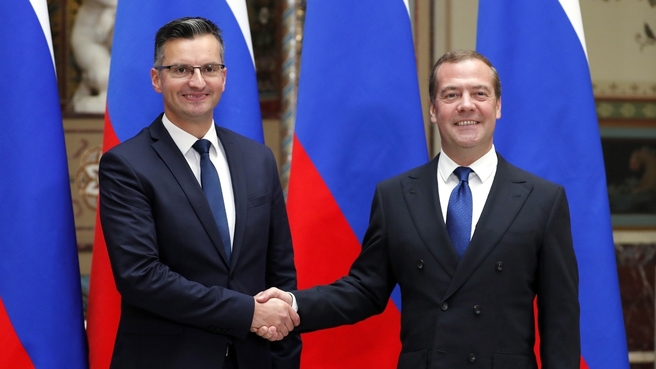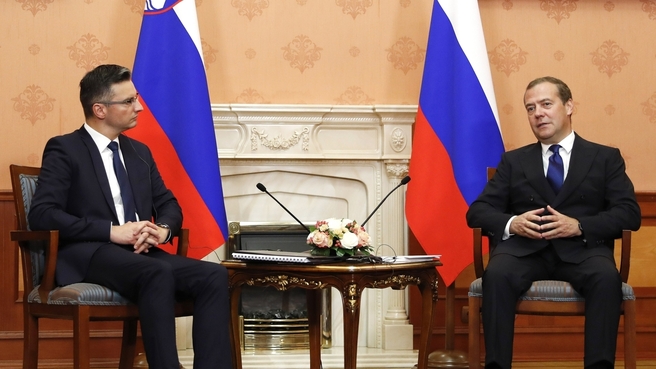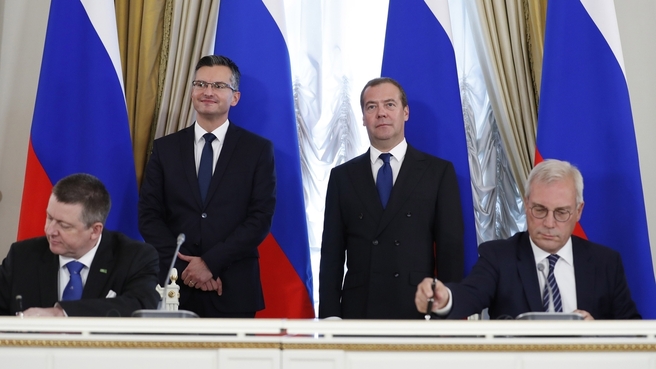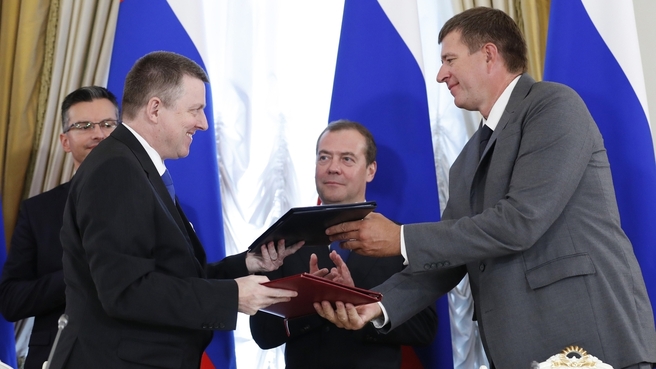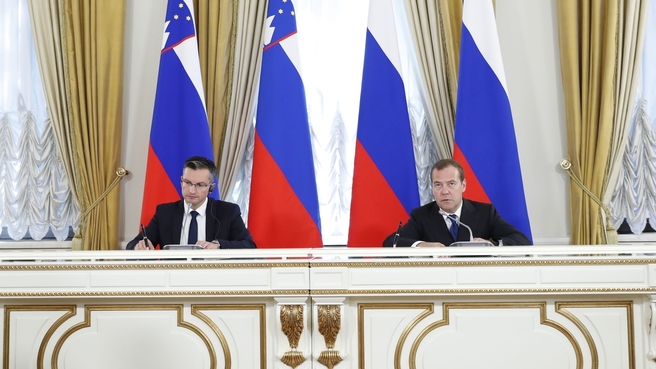Dmitry Medvedev held talks with Prime Minister of the Republic of Slovenia Marjan Sarec.
Meeting between Dmitry Medvedev and Marjan Sarec
Documents signed following talks
News conference by Dmitry Medvedev and Marjan Sarec following their talks
Meeting between Dmitry Medvedev and Prime Minister of Slovenia Marjan Sarec
Excerpts from the transcript:
Dmitry Medvedev: I am delighted to welcome you to Moscow.
Slovenia is a close partner for Russia in the European Union. Relations between our countries have a solid historical foundation. A monument to Russian and Soviet soldiers who perished during the world wars was unveiled in Ljubljana in 2016. On 1 September of this year, an Eternal Flame was lit at the monument from the flame that was brought from the Tomb of the Unknown Soldier in Moscow. Today we will unveil a monument to Slovenians who lost their lives in WWI and WWII. It is an important and symbolic event, considering that some people prefer to disregard history and forget its lessons, which is the wrong thing to do.
We maintain regular contacts. Nearly all of my colleagues make regular visits to your country. It is good that you have come [to Russia] and that your president visited us some time ago. I remember my visit to your country in 2015. I believe that the atmosphere of that visit was very pleasant. It was characteristic of the Slovenians’ attitude to Russia and of the spirit of our bilateral relations.
Of course, today we will talk about more than just our historic ties. We need to discuss the economy, the implementation of our cultural projects and a number of other topics. We will assess the results of our cooperation and then we will attend the unveiling ceremony.
I am pleased to turn the floor over to you and to welcome you to Moscow on this wonderful September day.
Marjan Sarec (via interpreter): Thank you very much, Mr Prime Minister, for receiving me and for your invitation. You and I met for the first time in Brussels. Back then, we had a very fruitful meeting, and you invited me to come to Moscow. I responded, and I brought a delegation consisting of several ministers together with representatives from business circles.
It is important that Slovenia and the Russian Federation maintain economic cooperation. The Russian Federation is an important partner for us. Thank you for being our reliable partner during natural gas deliveries. And, of course, the Russian Federation and the territory of Russia are very important for Slovenian exports.
We also view history as something important. We both have had a complicated history in the past, and we lived through difficult times and wars. We were part of another state during WWI. We faced numerous troubles. And the Russian Chapel that we respect and cherish was built when tragic events occurred. Russian prisoners of war who had perished during an avalanche are buried there. We cannot forget about this. Monuments highlighting our common history are very important; and we need to continue our cooperation in maintaining these landmarks. Russia paid a very high price during WWII, and many people were also killed in Slovenia. Those were very hard times. The Eternal Flame, now burning in Ljubljana, highlights our striving for cooperation, despite all political developments that surround current politics. Slovenia is a member of the European Union, and dialogue is therefore very important. We need to talk, and Slovenia is ready for dialogue. We need economic dialogue. The Slovenian economy prioritises exports of goods. We want to enter new markets, and the Russian Federation is our good and reliable economic partner.
<…>
The documents signed following talks:
Programme of Cooperation between the Government of the Russian Federation
and the Government of the Republic of Slovenia in Culture, Science, Education,
Sports and Youth Policy for 2019–2021
Signed by Deputy Foreign Minister of Russia Alexander Grushko and
Slovenia’s Ambassador Extraordinary and Plenipotentiary to Russia Branko
Rakovec
Programme of Cooperation between the Ministry of Justice of the Russian Federation
and the Ministry of Justice of the Republic of Slovenia for 2020–2021
Signed by Minister of Justice of the Russian Federation Alexander Konovalov
and Slovenia’s Ambassador Extraordinary and Plenipotentiary to Russia Branko
Rakovec
Plan of Consultations between the Ministry of Foreign Affairs of the
Russian Federation and the Ministry of Foreign Affairs of the Republic of
Slovenia for 2020
Signed by Deputy Foreign Minister of Russia Alexander Grushko and
Slovenia’s Ambassador Extraordinary and Plenipotentiary to Russia Branko
Rakovec
Programme of Cooperation between the Government of Moscow (Russian
Federation) and the Ljubljana City Hall (Republic of Slovenia) for 2019–2021
Signed by Mayor of Moscow Sergei Sobyanin and Mayor of Ljubljana Zoran
Jankovic
News conference by Dmitry Medvedev and Marjan Sarec following their talks
Excerpts from the transcript:
Dmitry Medvedev: Mr Marjan Sarec and I have just held talks on several diverse issues – both domestic and some important foreign issues.
I would like to say upfront that we were pleased to note that both Russia and Slovenia are motivated to promote cooperation and economic ties. We are making headway. I have already told my colleagues and want to emphasize once again that last year our trade grew after a decline due to related negative processes. This is largely the result of the efforts of our colleagues, including the intergovernmental commission. I hope these trends will continue.
We spoke about investment. Of course, we would like investment to be as large as possible. We support Slovenian companies including those that have established local production of medications, paint and coatings and telecommunications equipment.
Russian companies have also made serious investments. I am referring to the Industrial Metallurgical Holding and to Sberbank. We agreed to closely monitor this investment and seek opportunities to take part in bigger projects, including Slovenia’s infrastructure all the more so since our business communities maintain very good and close contact. It is great that my Slovenian colleague is in Moscow with a delegation of businesspeople. Obviously, the government needs to create conditions to promote this process while agreements must be concluded by our business communities.
A roundtable discussion with Russian businesspeople will be organised for their Slovenian colleagues. I hope it will lead to new agreements.
We are developing cooperation in culture, education, science, sports and youth policy. Today we signed an intergovernmental programme of cooperation in these areas until 2021. It is a full roadmap. The related departments and organisations will carry out interesting humanitarian projects based on this.
These include expanding the activity of the Forum of Slavic Cultures in Ljubljana. In November, we will celebrate its 15th anniversary. This is particularly important now that there are some problems in communication. The forum provides for an exchange of exhibitions, guest performances by musical bands and theater companies, and sports and youth events.
We talked about the international situation and discussed some issues. I would like to emphasise that we appreciate that our friends in Slovenia favour normalisation of relations between Russia and the European Union. We consider this important under the realisation that ultimately this is the domestic affair of the countries in the EU. We will wait for a new direction and hope that the atmosphere will change sooner or later.
Once again, I would like to thank my Slovenian colleague and the Slovenian delegation for this constructive dialogue. I would also like to express my sincere opinion that there is an atmosphere of trust and a great potential for developing relations between our countries. I hope the initiatives we discussed today (we will continue the talks in an extended format) will help promote mutual understanding between our countries and peoples, which have a common history. We revere and appreciate this history. This is why right after the talks on Poklonnaya Hill at Victory Park we will unveil a monument to Slovenians that perished in Russia during the first and second world wars.
This takes care of my remarks, and I would like to give the floor to my colleague, Prime Minister of Slovenia Mr Sarec. Go ahead please, Mr Sarec.
Marjan Sarec (via interpreter): Mr Prime Minister, ladies and gentlemen,
I am very pleased to be in Moscow with a small delegation today. The Prime Minister and I had high-quality and substantive talks covering numerous areas and matters.
The purpose of my visit to Moscow is to confirm our good relations, to improve our mutual dialogue and of course, to search for other possible ways to expand and deepen bilateral cooperation.
Russia and Slovenia are friendly nations with good trade and other relations.
Russia ranks 10th in the number of tourist visits to our country.
We hope that this visit, the memoranda and documents that were signed today will strengthen the legal framework underlying our cooperation.
Russia is our ninth largest partner in terms of exports from our country. And, of course, it is a very important partner given the large number of investments Slovenian enterprises have made in Russia. This cooperation is important for us.
The statistics show that the volume of trade increased 36 percent during the first half of this year. I hope that this cooperation will expand, because today I’m accompanied by representatives of business circles and companies with established presence in the Russian and international markets. They enjoy a very good reputation and standing. They operate in industries like energy, information technology and efficient use of energy resources. These companies are carrying out very good projects in the Russian market; these projects are successful. Today, we will focus on these projects in our meeting with Minister of Communications and Mass Media Noskov.
I would also like to inform you that my colleague, the Prime Minister of Russia, and I exchanged views on international issues and the international community. I very much value the opinion and the point of view of my interlocutor. Perhaps, our points of view do not always coincide, but we need to listen to each other. All opinions matter.
The Prime Minister of Russia also informed me about the events in the Middle East and the agreement with Iran. With regard to security and stability, the Western Balkans are very important to Slovenia. We have discussed this with the Prime Minister as well.
Let me complete my speech and draw your attention to a very important item on our programme. Mr Medvedev and I will attend a ceremony for the unveiling of a monument to Slovenians that perished during the first and second world wars in Russia. This ceremony will take place on Poklonnaya Gora at Victory Park. We will unveil the monument to immortalise their achievements. This is very important for us because a lot of people perished during these wars both in Russia and Slovenia. The world should remember these losses. This is a reminder for everyone: this should never happen again.
Mr Prime Minister, thank you very much for the warm reception and meeting. I would be happy to meet with you in my home country.
Question: TASS news agency. Mr Medvedev, you talked about the need to normalize relations between Russia and the EU. In the last few years the emphasis in Russia-EU relations has moved from a multilateral format to bilateral tracks because of various circumstances. A return to the G8 format has begun to be suggested. Do you think the G8 can resume multilateral economic cooperation in this format?
Dmitry Medvedev: Russia-EU relations are at a very low level now. We can live without it since we are developing bilateral relations with our friends from Slovenia and many other European countries individually. However, this is not normal. We will have to see whether the new leaders of the European Commission are ready to take measures to normalise relations. But this cannot be accompanied by any preconditions, because it was not us that limited our relations. If they want to restore them, we will restore them. I have said this many times to the EU’s current leaders because a full dialogue is still difficult without them.
You mentioned the G8, now the G7. This is a specific format. I took part in G8 sessions more than once. We were never allowed to take part in the G8 on a full scale. When strictly economic matters were discussed, our partners told us: please wait a bit while we discuss issues within the G7 and we will invite you to join us later. The G8 was a venue for discussing various political challenges and issues in a narrow circle. It was probably not useless, but I can say that even 11 years ago when I first took part in the G8 summit it was obvious that the G8 was not fully legitimate because regardless of the format (the outreach format, for one), other countries, including China and India and others were invited because it is practically impossible to resolve international issues without them.
So, when the G20 came together, it became obvious that the majority of the most urgent issues could be discussed in this format. But this does not apply to all issues since some states are not included in the G20. Slovenia is not a member of the G20. Yes, there are EU representatives in it but these are still different things. There are also some universal formats like the UN, different security forums and so on.
In other words, I wouldn’t exaggerate the importance of the G7. It is quite obvious that its members discuss mostly local issues. These issues are discussed by interested parties, just as they were before. It is indeed strange to hear our partners say: if Russia mends its ways we will return it to this format. I think President Trump said, with good reason, that they only need to ask Russia whether it needs this or not.
Our President has formulated our position, and I would like to repeat that, of course, we would like to communicate in different venues. If there is an invitation, we would probably consider it. But I would like to emphasise again that in today’s world limited formats cannot be used for decisions that are important for promoting the development of humanity and settling urgent issues.
It is best to include as many participants as possible in these discussions.
Question: Slovenian television. Good afternoon, Mr Medvedev. Trade between Slovenia and Russia has increased a bit in the past two years. A good trend is taking shape. But the fact remains that for the most part, Slovenia imports gas from Russia, and Slovenian companies focus on exporting pharmaceuticals that account for 40 percent of all exports.
For about 15 years we have been hearing that the two countries would like to increase trade to $2 billion. What areas need to be developed to achieve this goal? Maybe this figure is too high considering that for now Russia’s economic growth is fairly modest and that the Western sanctions are still in place?
Another brief question. In what industries is Russia, its companies, ready to invest in Slovenia?
If possible, a brief question to Mr Sarec (retranslated): As we know, trade between our countries has grown considerably in the past few years. Last year it was about $1.3 billion. What do you think about the potential of Russian-Slovenian relations in this area?
Dmitry Medvedev: Let me start by answering this question. We said today that trade has still grown recently. This is a very gratifying fact. The figures you quoted are correct. According to our data, trade increased by 9 percent in 2018 (statistics are always tricky and different countries often have varying figures) but it has now reached $1.3 billion. There is certainly potential to bring it up to $2 billion.
There are traditional sectors for cooperation, including energy, the supply of certain raw materials from Russia, and imports of consumer goods and pharmaceuticals from Slovenia, but we need to expand our trade. We have talked about this today. There are a number of fairly important projects in infrastructure, railways, high technology and digital cooperation. I told Mr Sarec that regardless of the size, no country can exist just on its domestic wealth, be it oil, gas or some other minerals. Anyone that focuses on this is most likely to be on the sidelines of progress in the 21st century. So, smart decisions are required. Our Slovenian friends can suggest them and we can offer many solutions. This kind of cooperation is very important.
As for opportunities, everyone has difficulties and problems, but I don’t see any reason for not bringing trade to the figures that were mentioned and even for exceeding them, regardless of sanctions or other issues in international markets, including trade wars, etc. Everything is in our hands. I hope that the visit of a representative business delegation from Slovenia will facilitate this as well. The political authorities in our countries will do everything they can for this purpose.
Marjan Sarec (via interpreter): Sometimes when the Russian companies registered in Slovenia are discussed, it is said that there is no result from their activities. This is untrue. If this was the case we wouldn’t have the scale of trade we do now. But we should not stop at what we have achieved. It is always possible to improve, increase or strengthen something. We are ready to increase exports to the Russian market. This issue was on the agenda of our government meeting. Of course, we have to consider the restrictive sanctions, but I am sure we can still reach our goals. I don’t want to talk about worst case scenarios. I am convinced that we can increase bilateral trade by pooling our efforts, by developing cooperation. I am confident that the Russian companies that are established and are operating in Slovenia are making a no small contribution to trade and economic cooperation.
